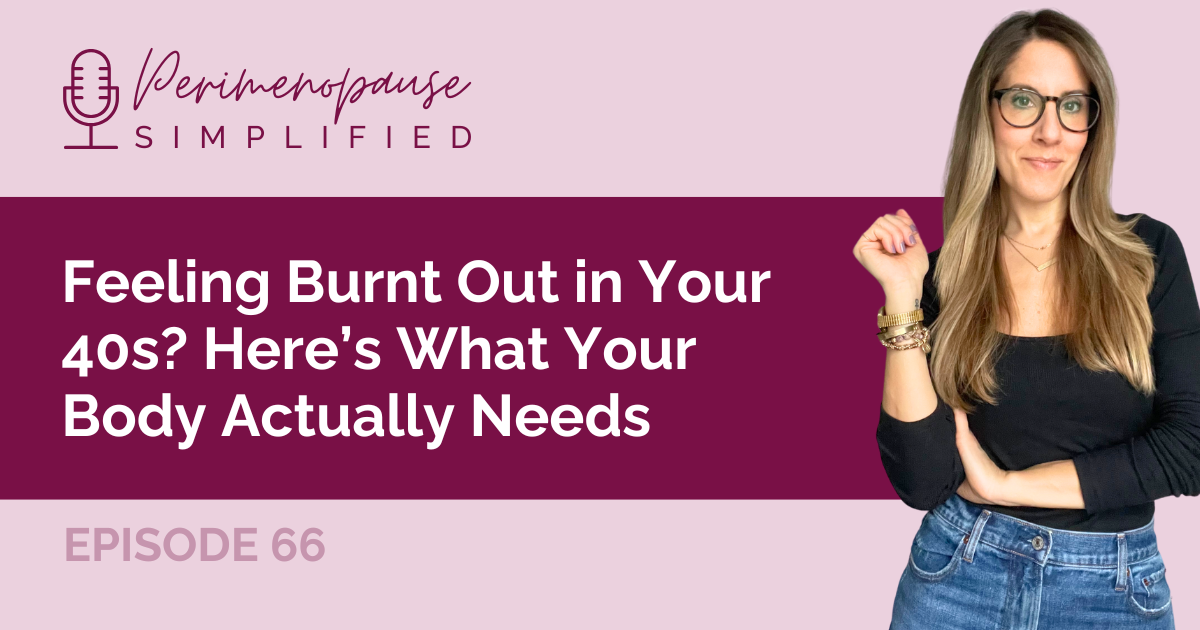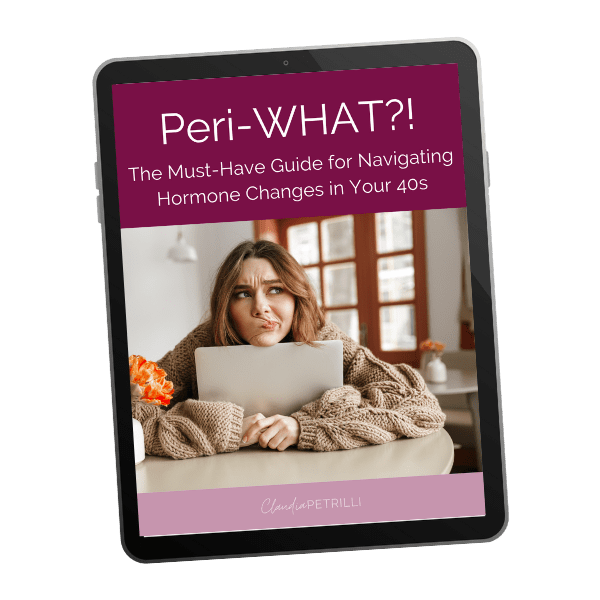
66. Feeling Burnt Out in Your 40s? Here’s What Your Body Actually Needs
Don’t Miss An Episode!
Feeling more tired, anxious, or irritable in your 40s—but still pushing through like you always have? In this episode, Claudia shares why the “hustle mode” that may have worked in your 30s starts to backfire in perimenopause–and what to do instead.
She opens up about the personal changes she’s made to her daily and weekly rhythm, and walks you through 5 simple, doable practices to help you preserve energy, regulate your nervous system, and feel more like yourself again.
This isn’t about doing nothing. It’s about moving through life with intention, clarity, and ease, especially in a body that’s changing.
In this episode, you’ll learn:
- Why women in their 40s become more stress-sensitive
- How pushing through, over-scheduling, and constant “doing” impacts your symptoms
- Real-life shifts Claudia made to stop burning herself out (and how you can too)
- 5 simple practices to reduce anxiety, feel more grounded, and prioritize what matters
- How pleasure, nature, and movement support hormonal health in midlife
- A reframe on slowing down as a strategy for productivity and well-being
What “Taking Care of Yourself” Really Means in Your 40s+
You’ve probably heard it a hundred times: “you need to take better care of yourself.” But what does that actually mean… and why is it so essential in your 40s and above?
In this episode I’m diving into some of the shifts I’ve made personally over the past couple years to slow down—not because I became lazy, but because I realized my old pace was burning me out.
Your Body Is Changing—and It Needs Something Different
So let’s start with the truth: you are not wired the same way you were at 25. Your body, your hormones, your nervous system…they’re all shifting.
And with those changes comes a heightened sensitivity to stress. The “push through, get it done, hustle mentality” that may have worked in your 30s? It starts to backfire in this phase of life.
That tension you feel in your chest. The anxiety that creeps in out of nowhere. The irritability, the fatigue, the feeling of “I’m doing everything right – but still don’t feel like myself.”
A lot of it? Comes from always doing, pushing, fixing and controlling. Those of you who identify as Type A women, yeah, I’m talking to you.
In our 40s, as hormones are shifting, your body is asking for something else. And it’s not just about long baths, yoga or pedicures – though those things are wonderful – there’s more to it.
If you caught last week’s episode on the nervous system and why it’s the missing piece for so many women in midlife—awesome. If not, I recommend going back and giving it a listen. Because today, I want to build on that by sharing what this actually looks like in daily life.
Ditching the Hustle Mentality
I used to jam everything I could into Mondays. I thought that if I hit the ground running and knocked things off my list, I’d feel accomplished.
But honestly? I was anxious, overwhelmed and overstimulated by 10am. That pressure was completely self-imposed—and it was wearing me down.
Now? I mostly (because I am human and sometimes slip), ease into my week and day. Without rushing. Without forcing.
Yes, You Can Slow Down—Even If Life Feels Full
Because when we work smarter, not harder… when we learn how to manage our time with intention…when we drop the hustle mentality and honor our hormones—everything changes.
You may be thinking..well that’s nice for you Claudia – you have your own business, you work from home and you don’t have kids. I get that – I really do. My life is different than most.
But running a business, especially after the last 4-5 years as the online landscape has changed, supporting clients in the way we do, leading a team, staying up to date on research, creating content for the podcast, and showing up on social media, is not for the faint of heart, my friend. I have a lot on my plate. In addition to making time to connect with my partner and supporting family.
But the things I’m sharing with you today are things I believe anyone can do regardless of your life choices.
How Slowing Down Supports Hormones & Mood
So I’m going to cover what it looks like to adopt a slower, more feminine rhythm that actually supports your energy, metabolism, mood, and nervous system and how the fast pace most of us are used to – greatly impacts our perimenopausal symptoms.
The way we’ve been taught to operate—constantly doing, producing, achieving—doesn’t really feel good to us, at least not for me. And many clients tell me they wish they could slow down, work less, and some have been forced to because their symptoms are so life-altering.
As we experience these hormone shifts, we do become more stress-sensitive. Estrogen and progesterone are declining and fluctuating. Cortisol becomes harder to regulate. Your nervous system gets activated more easily. Your thyroid may slow down. And your body tends to become less forgiving when you override its signals.
This isn’t about gloom and doom – it’s the reality of MANY women. But I don’t believe we need to suffer through this or just accept it as our fate.
And trust me, I feel it too. Most days I feel good because of all the things I do for my health and with the help of HRT, but right now at the time of this recording, I’m about a week out from my period and I’m irritable. I woke up a bit anxious today. So I know, the things I’m about to share are vital during this time of the month especially.
What we used to get away with—pulling all-nighters, skipping meals, drinking a lot of alcohol, pushing through fatigue—it all starts to catch up. And the symptoms show up as:
-
Anxiety
-
Insomnia
-
Irritability
-
Weight gain
-
Fatigue
-
Feeling emotionally drained & disconnected
Redefining What Self-Care Really Looks Like
Slowing down isn’t just a nice idea. Your body is asking for a new way. A softer way. A smarter way.
Let me walk you through five practices that will help you nourish your nervous system, reconnect with your body and build emotional resilience that you need in midlife.
And just to be clear—I’m not saying we should call it in, become sloths, and lay around doing nothing. Although, sometimes we DO need that.
I believe midlife is the ultimate opportunity for transformation—whether it’s starting a new career, a business, picking up a new hobby, traveling or just assessing what’s working and what isn’t.
But when I say “slow down,” I mean:
→ Stop rushing.
→ Let go of the mile-long, unrealistic to-do list.
→ Release the pressure to do it all yourself.
Slowing down doesn’t mean stopping. It means moving with intention. Choosing where you focus your energy. And making space for what actually matters.
These are things I’ve been trying to implement, either weekly or daily. They may not look exactly the same for you, but that’s OK – my hope is that they will inspire you.
1. Body Check-In
Morning, before work – maybe close your eyes, play some soft music, put your hand on heart.
Ask yourself:
How am I feeling right now, in this moment?
Where am I holding tension?
If I feel anxious, annoyed – why?
What do I need more of today or this week?
When we take a pause and check in with ourselves, we gain wisdom. We gain clarity. We’re able to recognize what we need.
2. Spend Time in Nature
Morning, afternoon, evening – whenever you can, get outside. Get sunshine on your face. Breathe in the fresh air. Look at the beauty around you – this time of year there are flowers everywhere and they are gorgeous. Mike and I took Dawson to a park we love yesterday and took a long, slow walk. I literally stopped to smell the roses. And I took one home with me. Try to do this often – without your phone, without distractions. Your body holds onto stress. Mother nature helps you release it. Let her support you.
3. Sensual Movement
Do this daily or pick a day. Play your favorite music, don’t have a workout plan – just MOVE. Stretch. Dance. Move your hips. Let your body feel fluid, not mechanical. This helps release cortisol and reconnect with pleasure. I bought a course from Melissa Woodard, she helps women move away from burnout. In her course, she includes movement practices.
I fully admit, the first time I tried one, I laughed and rolled my eyes. But when I allowed myself to really experience it, to move my body in a way I wasn’t used to, I cried. It was such a wonderful release. Because like many women, we tend to be a bit rigid and forget to breathe at times. We are controlling, we are taking care of everyone and it’s challenging to slow down and not be so damn structured.
4. Pleasure Hour
Once a week or once per day—maybe it’s Friday night or Sunday morning.
Do something for YOU – maybe it’s a bath, a nap, laying outside, dancing, reading something beautiful or self-pleasure. Whatever makes you feel good, do more of that. Pleasure is medicine.
5. Start Rescheduling or Deleting
Something I do weekly, usually on Sundays, is I look at my calendar for the week ahead. I ask myself what’s necessary, what needs to get done? Can some things be moved to a later date…or can I delete some things altogether? The things we sometimes believe are necessary just aren’t. So ask yourself: what can I let go of?
Final Thoughts: Slowing Down Is the Strategy
Making time for these practices helps you preserve your energy, regulate your nervous system, and you tend to get more done – but with less effort and without feeling like you’re drowning. Because you shift your priorities rather than being all over the place.
So if you’ve been stuck in overdrive or you feel guilty for resting—start small. Choose one of these practices this week. Allow yourself to experience slowness and pleasure. Let go of the guilt – and allow yourself to rest.
Because thriving in perimenopause isn’t about doing more. It’s about finally letting go of who you think you should be—and learning to honor who you are now and who you are becoming.
If you’re looking for support, as always, check the show notes for different ways we can work together to help you feel better in this season of life. Thanks so much for listening – please share this with a friend and I’ll see you next time.
If this episode resonated with you, send it to a friend who needs to hear it. Please leave a rating and review, and remember—you’re not broken and healing is possible, when you prioritize it.
Thanks for listening and I’ll see you next time.
Links Mentioned
Episode 65: The Missing Piece Behind Anxiety, Fatigue & Weight Gain: Your Nervous System
Claudia Petrilli is a Functional Health Coach, Integrative Nutrition Coach, Women’s Health Educator, and creator of The Perimenopause Method. Having experienced debilitating periods, digestive issues, a sluggish thyroid, a pituitary tumor, and perimenopause symptoms in her late 30s, she knows exactly what it’s like to get dismissed by doctors and spend years searching for answers.
Connect with Claudia:
FREE GIFT: Peri-What?! The Must-Have Guide for Women 40+ Navigating Hormone Changes
FREE GIFT: Perimenopause Daily Checklist
WORK WITH US: The Perimenopause Method
BOOK A CLARITY SESSION: Perimenopause Clarity Session
HRT COURSE: Perimenopause HRT Roadmap
QUESTIONS? EMAIL: claudia@claudiapetrilli.com






